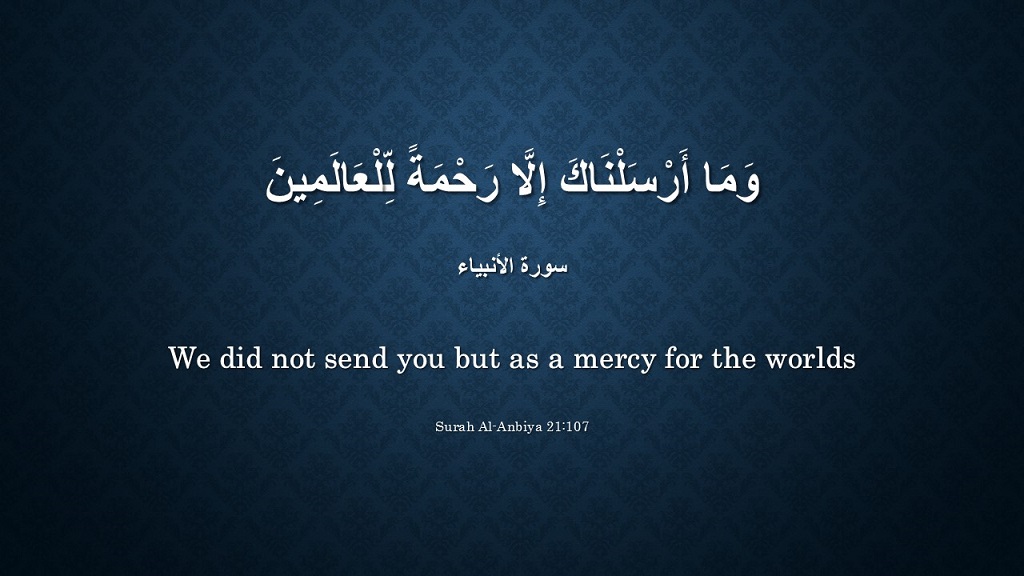The Oneness and Unity of God
All of the Qur’an is a proclamation of Tawheed. Some of the verses inform about God, His Names, Attributes, Acts and Speech. These verses indicate the Unity and Oneness of God with respect to His most excellent Names and perfect Attributes. Other verses call to the necessity of worshipping God alone, without any associate or partner and the renunciation of worship of anything other than Him. These verses indicate the Oneness and Unity of Worship and the necessity for people to single out their Lord in their intention, desire, requesting and their turning to Him. The Qur’an also contains injunctions and prohibitions, and so the doing of something or refraining from doing it is the fulfilment and perfection of the affirmation of the Oneness and Unity of God. In addition, the Qur’an includes stories and information about the people of true and sincere belief and tells of their immediate reward in the life of this world as well as the immense reward reserved for them in the hereafter. The Qur’an also contains stories about those who associate partners with God and informs of their punishment in the life of this world and the punishment they are promised in the hereafter. This is the reward for those that associate partners with God and deviate from affirmation of God’s Oneness and Unity.
The Qur’an calls for the correcting and strengthening of peoples’ relationship with their Lord, and their relationship with each other. It also calls for people to correct and straighten their own selves, both inwardly and outwardly.
Concerning the straightening of a person’s relationship with other people, the Qur’an calls to behaviour which strengthens and reinforces social relationships such as the importance given to the role of the family.
So treating parents kindly, maintaining good relations with other family members, seeing to the rights and needs of wives and children, doing good to neighbours are all obligatory while disobeying parents, severing family ties and social isolation are all prohibited. The Qur’an also instructs that reconciliation should be encouraged between husband and wife if a dispute occurs between them to avoid the break up of the family and separation of the children.
In addition, the Qur’an instructs that all people should be treated with high moral behavior and noble manners such as smiling with them, being gentle in speech to them, controlling one’s anger with them, forgiving any harm or offence they may have caused and even returning that harm with good, in order that any spite or hatred might be removed from the hearts and that enmity be turned into love and affection. Whoever achieves this is promised an immense reward.
The Prophet, mercy and peace be upon him, instructed that even animals be treated fairly and with kindness, instructing that they should be fed and watered and informing that such action would be rewarded on the Day of Resurrection. He also instructed that they should not be made to carry a burden more than they could bear, nor tormented or caused undue suffering or killed unless they were harmful. And if an animal was to be eaten then it should be made to feel relaxed at the time of slaughter and other animals should not be slaughtered in front of it.
The Qur’an also enjoins both physical and spiritual cleanliness and purification. It encourages that the body be kept clean, the wearing of clean clothes and shoes and the use of perfume. A bath should be taken every Friday and after sexual intercourse and ablution performed before prayer, nails should be clipped, hair under the armpit plucked, pubic hair shaved, the moustache trimmed, the siwak (the small branch of a tree used for cleaning the teeth) used regularly and the private parts washed after going to the toilet.
Concerning spiritual purity the Qur’an instructs that the soul be straightened and corrected and that the heart be purified of spite, malice, jealousy, pride and inequity. It calls for integrity of heart and love, affection and humility towards people. It instructs that the tongue be purified from lying, backbiting, slander and insulting people and adorned with truthfulness and softness of speech. The eyes should be restrained from looking at pornographic pictures and at peoples’ private parts and the ears should be kept from listening to loose and immoral talk. The Qur’an praises and encourages knowledge and criticizes ignorance saying that it leads to destruction. It commands to action and dynamism while prohibiting inaction and laziness. Likewise, the Qur’an calls to all similar praiseworthy behavior and virtuous qualities.
 The Qur’an also calls to the protection and sanctity of peoples’ lives and specifically mentions that the taking of an innocent life is one of the worst and most hideous crimes. The Prophet forbade breaking the bones of a dead animal so what about the taking of an innocent life? The Qur’an prescribes a life for a life and an eye for an eye for all injuries, however large or small, unless the family of the person killed or the injured person accepts financial compensation instead.
The Qur’an also calls to the protection and sanctity of peoples’ lives and specifically mentions that the taking of an innocent life is one of the worst and most hideous crimes. The Prophet forbade breaking the bones of a dead animal so what about the taking of an innocent life? The Qur’an prescribes a life for a life and an eye for an eye for all injuries, however large or small, unless the family of the person killed or the injured person accepts financial compensation instead.
The Qur’an commands that peoples’ property and wealth be safe and inviolable and therefore prohibits theft, bribery, usury and deception. It calls for moderation in spending and so forbids extravagance, lavishness and the squandering of money while at the same time forbidding the hoarding and amassing of wealth. It calls for balance and commands that people should neither be greedy and covetous nor spend thrifty and wasteful. It encourages the seeking and striving for provision in lawful ways such as buying, selling and renting – activities that bring financial or material benefit to all parties concerned – as well as safeguarding the rights and needs of the poor, especially those of them who are relatives. Islam promotes the protection of good health and has therefore commanded that only wholesome and nutritious food in moderation be eaten and has prohibited the consumption of all bad and harmful food and drink such as carrion, liquor, smoking, drugs and so forth. It also prescribes fasting that has many benefits for the body, especially the stomach.
The Prophet, mercy and peace be upon him, taught many general good manners, including the virtue of adopting the correct manners for eating and drinking. These include eating with the right hand and not finding fault with the food but rather being satisfied with it. Therefore, if someone likes the food, they should eat it but if they have no appetite for it, they should leave it without criticizing it. This is both out of respect for the blessing of the food and in order not to hurt the feelings of the person who cooked it. It is also preferred that a person eats with others and not alone, either by eating with his family or by inviting a poor person to eat with him.
The words ‘In the name of God’ (bismillah) should be said before beginning to eat, and ‘All praise belongs to God’ (Al-hamdulillah) after finishing the food, in order that people remember the blessing they have been given and the One who provided it. The prophet, mercy and peace be upon him, also prohibited people from blowing on food or drink or breathing on to it, out of respect for others who may be sharing it and to avoid the spread of contagious diseases.




